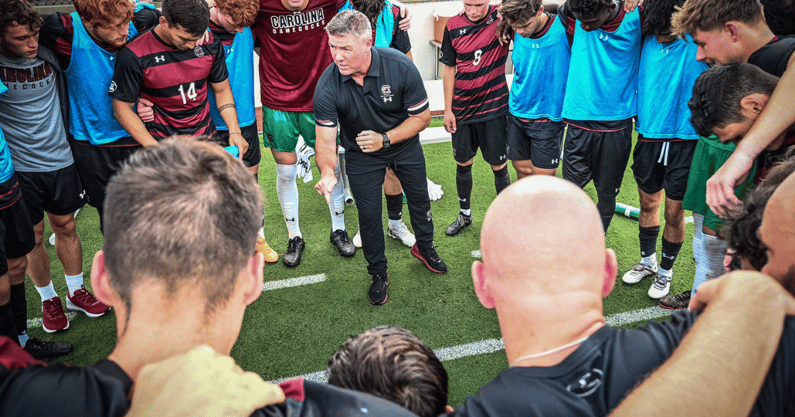Q&A with South Carolina soccer coach Tony Annan (Part I)

Tony Annan just wrapped up year one as South Carolina’s soccer coach.
Annan, who spent a large chunk of his career with Atlanta United, took over a South Carolina program as its second-ever coach.
The Gamecocks are getting ready for their second season under Annan. Recently, Annan spoke with GamecockCentral about the year, recruiting and more. Here’s the first part of a nearly 30-minute interview.
GCC: What do you feel like you learned in year one at South Carolina?
TA: “The first thing, I talked about it during the season, is the adjustment of the level of the arena you’re working in and coming into a brand new arena and the challenges that pose to you. But it also poses a challenge to the players. I followed an icon, a legend, at South Carolina. It’s never easy to follow somebody with that history. But we’re very different in the way we coach, our methodologies. Our approach to development I’d imagine is very different.
So it wasn’t only a challenge for me but it was a challenge for the players who were already here that had been recruited for me. Things went from, for some of them, zero to 100. The reason I took the job here is number one I love the place and thought it was a place I’d really like to work. Then two the challenge for myself and for my career and for my holistic approach to coaching I thought it was a big challenge.
Year one I would say is revealing, that’s the word I would use. I’d use adjustment. I had to make big adjustments to the way I did things. But it was enjoyable. It’s part of the process, part of who I’m trying to be. This first year gave me a lot of challenges and questions to ask, which is what I wanted. I was very fulfilled by the first year but excited about the anticipation of what could come.”
GCC: You mentioned changes, what were some of those?
TA: “I wouldn’t say it was an adjustment on my half more than it was on the players’ half is the way we trained. It was quite obvious they hadn’t had to train that way. It was a big adjustment for them, which they did really well at it, most of them. They adapted to it and for a while, there were thriving, I thought.
For me, the biggest adaption was the style of play in the games and the adjustments I’m going to have to make to my philosophy to be successful. That’s perfectly all right for me. I had to be challenged that way. That was the biggest adaption I had to make and the biggest change I had to look at. Maybe I didn’t do it quick enough.
Top 10
- 1Breaking
Dylan Stewart
Star EDGE on injury report
- 2Trending
Final Thoughts
Wes Mitchell on Ole Miss game
- 3Trending
Insider Report
Chris Clark previews the game
- 4
Injury report analysis
Impact of Jayden Sellers, Buddy Mack absence
- 5Hot
YouTubeTV dispute
Its effect on USC vs. Ole Miss
Get the Daily On3 Newsletter in your inbox every morning
By clicking "Subscribe to Newsletter", I agree to On3's Privacy Notice, Terms, and use of my personal information described therein.
But the environment itself. I’m working with professional players who are striving to be first-team players. Now I’m working with college athletes who are working to get a college education and be a college student and soccer doesn’t always come at the top of the list. That’s a particular aspect I had to deal with and adjust to. But I’m more than happy to make adjustments and change.”
GCC: How do those changes maybe affect how your team trains?
TA: “I think the biggest thing is I don’t think I’ll ever abandon my philosophy and the way I think the game should be played. Everyone’s opinion is different. That’s fine; everyone can play their own tactics. I don’t have any complaints. But everyone knows the way you train is the way you play.
If you train sloppy, train lazy or train with a slow tempo with low game demands and low game scenarios and train at a rate that doesn’t mimic the game then you can’t expect your team to play at that level or perform at that tempo with that aggressive mindset. Training has been trying to shift the mentality and try to train the habits and scenarios of games and scenarios for players to react to that are constantly changing so they have self-adaptation as well as coaching to help.
But it’s not rocket science. If you train in a poor fashion or a lazy fashion or a poor tempo or low game demands that’s what you get when you come into a game. That, I think, is the biggest point I continue to make and will continue to stress. How we train is how we play. Those habits have to come naturally instead of forced or imposed by me on the sideline.”
GCC: Have you seen the progress you wanted to?
TA: “The guys who are here that will continue in the spring and into the fall, every one of them made progress. Everyone adapted and took on and answered the questions that were answered to them. Yes. If that’s part of the progress we made, then yes we made progress.”
This is part one of a lengthy sit-down with Annan.